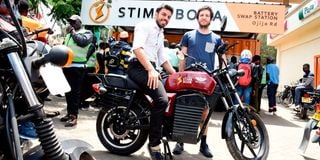Electric boda, the smarter more efficient way to get around

Stima Boda CEO, Jason Gras, (left) with co-founder Emile Fulcheri at the start-up’s battery swap station at Rubis Energy, along Ojijo Road, in Nairobi.
Started in 2020, Stima Boda emerged from a desire to create a more equitable society and sustainable planet through e-mobility, because transport impacts greatly on climate change. Through savings and grants from angel investors, Emile Fulcheri and Stima Boda CEO, Jason Gras, co-founded the entity in Nairobi, a hotbed for start-ups championing renewable energy.
Transport, like agriculture and manufacturing, has a great impact on climate change. According to the United Nations Environment Programme, two and three-wheelers are the fastest-growing mode of transport in the developing world.
Furthermore, the UN Environment eMob calculator shows a significant global shift to 90 percent battery electric motorcycles sales by 2030, which could result in CO2 emissions reductions of about 11 billion tons between now and 2050.
Gras says, “We observed riders spending so much on fuel and maintenance. In many other markets, you have electric motorcycles everywhere, but here the adoption had not started yet, so we thought it made sense to support riders to put more money in their pocket, at the same time contributing to cleaning the air in the cities, as well as contributing to fighting climate change.”
Electric motorcycles and electric mobility have two components, one is the electric motorbike itself, the other is the infrastructure.
“It is very important that both are at the highest level of performance, otherwise you won't be able to support them,” Gras explains.

Boda boda riders queue to swap batteries at Rubis, Ojijo Road, Nairobi.
The electric motorcycles are sold through a hire purchase model through financier, Mogo. The rider is expected pay a deposit of Sh15, 000, after which he makes a payment of Sh454 per day towards owning the bike. The final cost is not more than that of a motorcycle running on fossil fuel and can cover 80km per charge. But motorcycle riders cover approximately 100km or more per day, in this case, how have they addressed this shortcoming?
“This is where battery swapping comes in,” comments Gras.
At one of the start-up’s station along Ojijio Road in Nairobi, you will find rows of black boxes plugged to electricity. These are charged batteries ready for collection. It costs Sh280 to fully charge a battery, but the rider only pays for the energy he consumes, therefore, if he swaps a battery that needs half the charge, he will pay Sh140.
So, what’s the difference between a diesel-powered bike and an electric bike?
According to Gras, an electric engineer who has worked in markets such as China, an electric bike is much cheaper to run and maintain.
“A rider is able to save Sh300 per day in terms of energy. On the maintenance side, electric motorcycles are tubeless, therefore you don’t have to spend money replacing tubes. They also don't have chains and spark plugs and pistons, which require replacement at some point. With an electric bike, one saves approximately Sh300 daily, Sh10,000 monthly and Sh100,000 annually.”
Stima Boda is in a partnership with Bolt, (the taxi hailing company) which has onboarded the electric bikes in their app.
Gras comments, "We share the same conviction as our partners that we need to go electric to enable the riders earn more and contribute to a cleaner environment."
The start-up currently has four charging stations spread across Nairobi so far. The one along Ojijo Road, another along Mombasa and Thika Roads and a fourth in Dagoretti Corner, thanks to a partnership with Rubis Petrol Stations. The sub stations enable riders find replacement batteries easily.
At the time of the interview, conducted at the Ojijo Road outlet, the prefabricated container outlet held 30 charging batteries.
“The design of a swapping station is modular, this means locations with big demand will have bigger spaces with more batteries where riders can exchange batteries. Alternatively, in locations with lest demand, the batteries will be fewer."
So far, the venture has 30 motorcycles deployed across Nairobi, targeting an organic growth of 300 riders by the end of the year, with an estimated 1.5 million boda riders in the country to double their income by then.
Gras observes that two years ago when they started operating in the country, electric mobility was considered a strange thing, and they got lots of questions regarding how they would benefit those that invested in them. The government, says Gras, has received them well. For example, they have additional load to support more electricity consumption by Kenya Power that has extra capacity.
“We also have support from different ministries, such as the Ministry of Industrialization, Trade & Enterprise Development, which has been listening to the concerns of electric mobility companies,”
He adds, “If we take Rwanda as an example, it is the first country in East Africa to implement policies that support electric mobility and therefore have more electric motorcycles on the ground. We are getting there too. It is just taking a little bit more time here because the processes are longer, but we have good feedback from the government.”





